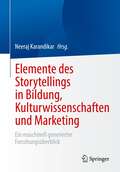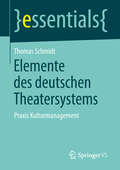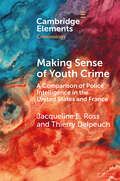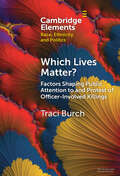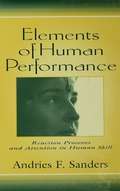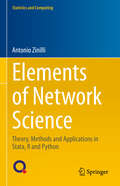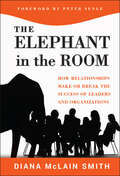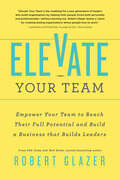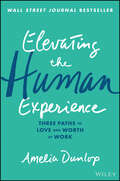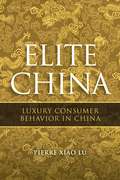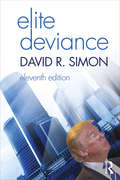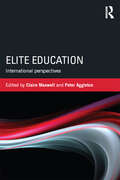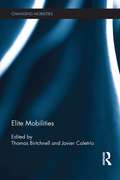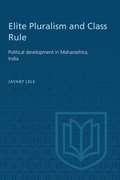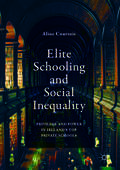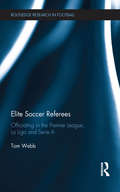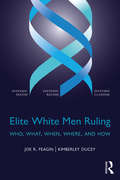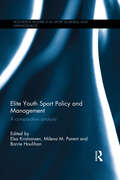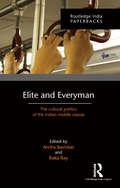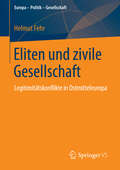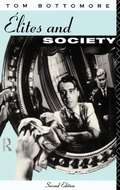- Table View
- List View
Elemente des Storytellings in Bildung, Kulturwissenschaften und Marketing: Ein maschinell generierter Forschungsüberblick
by Neeraj KarandikarDieses Buch ist ein maschinell generierter Überblick über den Einsatz von Storytelling-Elementen in den Bereichen Bildung, Kultur und Marketing. Das Buch gibt einen Einblick, wie sich das Erzählen von Geschichten mit verschiedenen menschlichen Aktivitäten überschneidet und diese beeinflusst. Diese AI-gestützte Zusammenstellung von Forschungsarbeiten ist eine nützliche Ressource für alle Leser, die sich für die Interaktion von Storytelling mit den oben genannten Themen interessieren.
Elemente des deutschen Theatersystems: Praxis Kulturmanagement (Essentials)
by Thomas SchmidtIn diesem essential werden die wesentlichen Merkmale, Strukturen und Elemente des deutschen Theatersystems vorgestellt. Die Theaterlandschaft ist der größte kulturelle Komplex in Deutschland. Gegenwärtig arbeiten 40.000 Mitarbeiter in den 130 öffentlichen Theatern und erreichen pro Jahr ca. 19 Mio. Zuschauer. Vor allem die Stadttheater mit ihren veralteten Leitungs- und Organisations-strukturen und ihrer Tendenz zur Überproduktion verlieren Zuschauer und das Vertrauen der Politik. Erste Lösungsvorschläge liegen vor: neue Organisations-, Leitungs- und Finanzierungsmodelle, die mehr Partizipation der Darsteller und Mitarbeiter, Gerechtigkeit, Diversität und Good Governance ermöglichen.
Elements in Criminology: A Comparison Of Police Intelligence In The United States And France (Elements In Criminology Ser.)
by Jacqueline E. Ross Thierry DelpeuchElements in Race, Ethnicity, and Politics: Factors Shaping Public Attention To And Protest Of Officer-involved Killings (Elements In Race, Ethnicity, And Politics Ser.)
by Traci BurchElements of Human Performance: Reaction Processes and Attention in Human Skill
by Andries F. Sanders Andries SandersThis book presents a review of research on reaction processes and attention as it has evolved over the last 40 years in the context of the information processing tradition in cognitive psychology. It is argued and demonstrated that issues of reaction processes and attention are closely interconnected. Their common conceptualization can be seen in terms of limited processing capacity on the one hand, and stage analysis on the other. This volume concludes that, at present, a stage analysis metaphor offers better prospects as a conceptual starting point; the limited capacity metaphor was strongly tied to the digital computers of the 60s. The emphasis of the book is on behavioral research, but summaries of related findings on evoked potentials and other psychophysiological variables are included as well. From this perspective, it may be of interest to neuropsychologists who want to learn about the present state of cognitive experimental paradigms. Elements of Human Performance also addresses the question of the relationship between basic research and applications in the said areas. This is particularly urgent in view of the now common notion that the results of many simplified laboratory tasks may be artifactual and of little applied value. A back-to-back research strategy is outlined to assess the validity of basic research results for real-life tasks.
Elements of Network Science: Theory, Methods and Applications in Stata, R and Python (Statistics and Computing)
by Antonio ZinilliThis book provides readers with a comprehensive guide to designing rigorous and effective network science tools using the statistical software platforms Stata, R, and Python. Network science offers a means to understand and analyze complex systems that involve various types of relationships. This text bridges the gap between theoretical understanding and practical application, making network science more accessible to a wide range of users. It presents the statistical models pertaining to individual network techniques, followed by empirical applications that use both built-in and user-written packages, and reveals the mathematical and statistical foundations of each model, along with demonstrations involving calculations and step-by-step code implementation. In addition, each chapter is complemented by a case study that illustrates one of the several techniques discussed. The introductory chapter serves as a roadmap for readers, providing an initial understanding of network science and guidance on the required packages, the second chapter focuses on the main concepts related to network properties. The next two chapters present the primary definitions and concepts in network science and various classes of graphs observed in real contexts. The final chapter explores the main social network models, including the family of exponential random graph models. Each chapter includes real-world data applications from the social sciences, using at least one of the platforms Stata, R, and Python, providing a more comprehensive understanding of the availability of network science methods across different software platforms. The underlying computer code and data sets are available online. The book will appeal to graduate students, researchers and data scientists, mainly from the social sciences, who seek theoretical and applied tools to implement network science techniques in their work.
Elements of Witchcraft: Natural Magick for Teens
by Ellen DuganIn this book, Dugan writes for a teen audience, and talks about magickal ethics, the elements and how to use them, and how magick will change your life, if you believe, and let it in. There are many resources, including an extensive reading list, index and a journal throughout the book where you can pen your thoughts.
Elements of the Philosophy of Right
by Georg Wilhelm Friedrich HegelThis book is a translation of a classic work of modern social and political thought. Elements of the Philosophy of Right, Hegel's last major published work, is an attempt to systematize ethical theory, natural right, the philosophy of law, political theory, and the sociology of the modern state into the framework of Hegel's philosophy of history. Hegel's work has been interpreted in radically different ways, influencing many political movements from far right to far left, and is widely perceived as central to the communitarian tradition in modern ethical, social, and political thought. This edition includes extensive editorial material informing the reader of the historical background of Hegel's text, and explaining his allusions to Roman law and other sources, making use of lecture materials which have only recently become available. The new translation is literal, readable, and consistent, and will be informative and scholarly enough to serve the needs of students and specialists alike.
Elephant in the Room
by Peter Senge Diana Mclain SmithA systematic look at how relationships determine the success of leaders and their enterprises, along with tools to help strengthen and change themSince time immemorial, relationships have determined the fate of leaders. But today they are more critical to success than ever. No longer can leaders count on long time horizons or sloppy competition to make up for the inefficiencies that poor relationships create. Leaders must make decisions and take actions quickly and well with others, even those with whom they share very little?perhaps not even a time zone. This new world puts relationships at the center of what leaders must understand and master to succeed. Uses in-depth observational studies and clinical research to explore how relationships at the top of organizations work, develop, and changeShows how to understand, strengthen, and transform these relationships, so they can withstand the most intense pressures and conflictsThis important book features a Foreword by Peter Senge, author of The Fifth Discipline.
Elevate Your Team: Empower Your Team To Reach Their Full Potential and Build A Business That Builds Leaders
by Robert GlazerAn impactful and essential follow up to the USA Today and Wall Street Journal bestseller ElevateEvery leader knows this delicate balancing act: to simultaneously generate better performance from your team, retain top talent, and build your organization's leaders of tomorrow, without inducing burnout. In the sequel to his bestseller Elevate, Robert Glazer applies his groundbreaking capacity-building framework to teams and organizations alike. The result is the playbook for a results-oriented, learning-driven culture that elevates its people to meet the company's ever-changing growth needs.Glazer, a serial entrepreneur, award-winning CEO, and #1 Wall Street Journal bestselling author, shares a framework of proven, actionable strategies that will help you up your game as a leader, help your team reach their full potential, and most importantly build the new generation of leaders from within your organization."Elevate Your Team is the roadmap for a new generation of leaders who build organizations by helping their people thrive both personally and professionally — without burning out. Robert Glazer shares a vision for creating lasting organizations where people love to work" — Arianna Huffington, Founder & CEO, Thrive Global"This book is at once perceptive and practical. It will open new vistas for your own thinking about leadership and equip you with a host of tools and tips to build capacity in your team. Follow Bob Glazer — or prepare to be left behind!" — Daniel H. Pink, #1 New York Times Bestselling Author of Drive, To Sell Is Human, and The Power of Regret"A team that reaches its full capacity is a force to be reckoned with! Robert Glazer provides an evidence-based road map for achieving this goal." — Cal Newport, New York Times Bestselling Author of A World Without Email and Deep Work
Elevating the Human Experience: Three Paths to Love and Worth at Work
by Amelia DunlopHave you ever struggled to feel worthy at work? Do you know or lead people who do? When Amelia Dunlop first heard the phrase "elevating the human experience" in a leadership team meeting with her boss, she thought, "He is crazy if he thinks we will ever say those words out loud to each other much less to a potential client." We've been conditioned to separate our personal and professional selves, but work is fundamental to our human experience. Love and worth have a place in work because our humanity and authentic identities make our work better. The acknowledgement of our intrinsic worth as human beings and the nurturing of our own or another's growth through love ultimately contribute to higher performance and organizational growth. Now as the Chief Experience Officer at Deloitte Digital, a leading Experience Consultancy, Amelia Dunlop knows we must embrace elevating the human experience for the advancement and success of ourselves and our organizations. This book integrates the findings of a quantitative study to better understand feelings of love and worth in the workplace and introduces three paths that allow individuals to create the professional experience they desire for themselves, their teams, and their clients. The first path explores the path of the self, an inward path where we learn to love ourselves when we show up for work, and examines the obstacles that hinder us. The second path centers around learning to love and recognize the worth of another in our lives, adding to the worth we feel and providing a source of meaning to our lives. The third path considers the community of work and learning to love and recognize the worth of those we meet every day at work, especially for those who may be systematically marginalized, unseen, or unrepresented. Drawing on her own personal journey to find love and worth at work in her twenty-year career as a management consultant, Amelia also weaves together insights from philosophers, theologians, and sociologists with the stories of people from diverse backgrounds gathered during her research. Elevating the Human Experience: Three Paths to Love and Worth at Work is for anyone who has felt the struggle to feel worthy at work, as well as for those who have no idea what it may feel like to struggle every day just to feel loved and worthy, but love people and lead people who do. It’s a practical approach to elevating the human experience that will lead to important conversations about values and purpose, and ultimately, meaningful change.
Elite China
by Pierre Xiao LuA ground-breaking exploration of the Chinese elite's consumption of luxury products and their attitudes toward luxury goods. Elite China identifies the Chinese luxury product consumers and the characteristics of their luxury consumption, explains the implications for luxury firms and marketers and most importantly, spells out strategies for international luxury brands and Chinese luxury brands to succeed in Chinese market.
Elite Deviance (Mysearchlab Series 15% Off Ser.)
by David R. SimonTracing the causes of elite deviance to the structure of U.S. power and wealth, this book introduces students to theories of elite deviance and covers both criminal and non-criminal elite acts that cause significant harm. This considerably updated, 11th edition enriches its coverage of both historical and contemporary elite deviance. Updates include: New and expanded discussions on history, property, and historical critique from Revolutionary America onward. New analysis on Donald Trump: his cabinet members of the political elite, his relationship with the EPA, and his business connections. Investigation into Caribbean and European tax havens. An extended review on elite deviance and increasing inequalities. Very current information and examples of scandals in international conflicts. The section on changing media patterns.
Elite Education: International perspectives
by Peter Aggleton Claire MaxwellElite Education – International Perspectives is the first book to systematically examine elite education in different parts of the world. Authors provide a historical analysis of the emergence of national elite education systems and consider how recent policy and economic developments are changing the configuration of elite trajectories and the social groups benefiting from these. Through country-level case studies, this book offers readers an in-depth account of elite education systems in the Anglophone world, in Europe and in the emerging financial centres of Africa, Asia and Latin America. A series of commentaries highlight commonalities and differences between elite education systems, and offer insights into broader theoretical issues, with which educationalists, researchers and policy makers are engaging . With authors including Stephen J. Ball, Donald Broady, Rubén Gaztambide-Fernández, Heinz-Hermann Krüger, Maria Alice Nogueira, Julia Resnik and Agnès van Zanten, the book offers a benchmark perspective on issues frequently glossed over in comparative education, including the processes by which powerful groups retain privilege and ‘elite’ status in rapidly changing societies. Elite Education – International Perspectives will appeal to policy makers and academics in the fields of education and sociology. Simultaneously it will be of special relevance to post-graduates enrolled on courses in the sociology of education, education policy, and education and international development.
Elite Mobilities (Changing Mobilities)
by Thomas Birtchnell Javier CaletríoSmall in number but great in influence, mobile elites have shaped the contours of global capitalism. Today these elites continue to flourish globally but in a changing landscape. The current economic crisis—and rising concerns about the moral legitimacy of extreme wealth—coincides with stern warnings over the risks posed by climate change and the unsustainable use of resources. Often an out-of-bounds topic in critical social science, elites are thought of as too inaccessible a group to interview and too variable a minority to measure. This groundbreaking collection sets out to challenge this perception. Through the careful examination of the movements of the one per cent through the everyday spaces of the ninety-nine per cent, Elite Mobilities investigates the shared zones elites inhabit alongside the commons: the executive lounge in the airport, the penthouse in the hotel, or the gated community next to the slum. Bringing together the pioneer scholars in critical sociology today, this collection explores how social scientists can research, map, and ‘track’ the flows and residues of objects, wealth and power surrounding the hypermobile. Elite Mobilities sets a new benchmark in social science efforts to research the powerful and the privileged. It will appeal to students and scholars interested in mobilities, transport, tourism, social stratification, class, inequality, consumption, and global environmental change.
Elite Parties, Poor Voters
by Tariq ThachilWhy do poor people often vote against their material interests? This puzzle has been famously studied within wealthy Western democracies, yet the fact that the poor voter paradox also routinely manifests within poor countries has remained unexplored. This book studies how this paradox emerged in India, the world's largest democracy. Tariq Thachil shows how arguments from studies of wealthy democracies (such as moral values voting) and the global south (such as patronage or ethnic appeals) cannot explain why poor voters in poor countries support parties that represent elite policy interests. He instead draws on extensive survey data and fieldwork to document a novel strategy through which elite parties can recruit the poor, while retaining the rich. He shows how these parties can win over disadvantaged voters by privately providing them with basic social services via grassroots affiliates. Such outsourcing permits the party itself to continue to represent the policy interests of their privileged base.
Elite Pluralism and Class Rule: Political development in Maharashtra, India (The Royal Society of Canada Special Publications)
by Jayant LeleBased on a study of recent political behaviour in a rural region of India, the author presents a critique of pluralist theories of democracy and advances a new approach to political sociology. Professor Lele insists that the politicians of Maharashtra sustain, however dispersed, a hegemonic class rule. The processes of development and modernization directly serve strategies of private gain through the public sphere; the elites continue to enclose the public sphere while propagating the myth of open competition. Case studies of local, state, and national politicans illustrate this behaviour and show how competition between powerful alliances is effectively moderated. The concluding section proposes a new comparative approach to political sociology. It demonstrates the inherent contradiction between domination and community, and argues for a historical analysis of the rise and fall of classes and ideologies. Professor Lele challenges the emphasis on modernization and instrumentality in contemporary social science, and suggests that the insights of Marx and Weber can lead to a more previse and universal framework for the study of societies.
Elite Schooling and Social Inequality
by Aline CourtoisThis book is the first significant sociological study of Ireland's elite private schools. It takes the reader behind the gates of these secretive institutions, and offers a compelling analysis of their role in the reproduction of social inequality in Ireland. From the selection process to past pupils' union events, from the dorms to the rugby pitch, the book unravels how these schools gradually reinforce exclusionary practices and socialize their students to power and privilege. It tackles the myths of meritocracy and classlessness in Ireland, while also providing keys to understanding the social practices and legitimacy of elites. By bringing out the voices of past pupils, parents and school staff and incorporating vivid ethnographic descriptions, the book provides a rare snapshot into a privileged world largely hidden from view. It offers a unique contribution to research on elite education as well as to the broader fields of sociology of education and inequality. As such, it will appeal to researchers, practitioners and the general public alike, in Ireland and beyond.
Elite Soccer Referees: Officiating in the Premier League, La Liga and Serie A (Routledge Research in Football)
by Tom WebbSoccer is undeniably the most popular sport in the world. While we know much about its high-profile players and their increasing wealth and global influence, we know little about referees and the ways in which refereeing has changed throughout the history of the sport. This book provides an in-depth exploration of the evolution of the match official. It presents a comparative analysis of elite Association football referees in England, Spain and Italy, as well as offering insights into the involvement of UEFA and FIFA in referee training. Drawing on archive material, the book documents the historical development of refereeing and sheds new light on the practice of elite refereeing in the present day. Including exclusive interviews with elite and ex-elite referees, as well as with professional soccer managers and members of the broadcast media, it considers the current role of match officials and the challenges and controversies they encounter. Elite Soccer Referees: Officiating in the Premier League, La Liga and Serie A is fascinating reading for all students and scholars with an interest in soccer, sport history, sport policy, sport management and the sociology of sport.
Elite Sport and Sport-for-All: Bridging the Two Cultures? (ICSSPE Perspectives)
by Margaret Talbot Richard BaileySport is often perceived as being divided into two separate domains: mass participation and elite . In many countries, policy and funding in these two fields are managed by separate agencies, and investment is often seen as a choice between the two. Elite Sport and Sport-for-All explores the points of connection and sources of tension between elite and mass participation sport. The book’s multi-disciplinary and international line-up of contributors seeks to define, examine, and develop solutions to this problematic relationship. Drawing on research and case studies from around the world—with examples from Denmark, Canada, South Africa and Israel—the book explores key contemporary issues including: does effective talent identification require depth of participation? do elite performances inspire greater participation? the role of the Paralympic movement in mass participation and elite sport; and the economic aspects of their co-existence. The first study of its kind, Elite Sport and Sport-for-All addresses a central dichotomy in sport policy and, as such, is important reading for all students, researchers, policy-makers or administrators working in sport development and policy.
Elite White Men Ruling: Who, What, When, Where, and How
by Joe R. Feagin Kimberley DuceyThis book examines the “who, what, when, where, and how” of elite-white-male dominance in U.S. and global society. In spite of their domination in the United States and globally that we document herein, elite white men have seldom been called out and analyzed as such. They have received little to no explicit attention with regard to systemic racism issues, as well as associated classism and sexism issues. Almost all public and scholarly discussions of U.S. racism fail to explicitly foreground elite white men or to focus specifically on how their interlocking racial, class, and gender statuses affect their globally powerful decisionmaking. Some of the power positions of these elite white men might seem obvious, but they are rarely analyzed for their extraordinary significance. While the principal focus of this book is on neglected research and policy questions about the elite-white-male role and dominance in the system of racial oppression in the United States and globally, because of their positioning at the top of several societal hierarchies the authors periodically address their role and dominance in other oppressive (e.g., class, gender) hierarchies.
Elite Youth Sport Policy and Management: A comparative analysis (Routledge Research in Sport Business and Management)
by Barrie Houlihan Milena M. Parent Elsa KristiansenElite youth sport competitions have increased significantly in number in recent years, with the Youth Olympic Games representing the high point of this phenomenon. This book examines the global context within which elite youth sport has emerged and continues to grow. It explores elite youth sport policy across fifteen countries, in Europe, the Americas, Africa and Asia, addressing the questions of how youth talent development is organised and why elite youth sport has become so popular. Taking a comparative global perspective, the book analyses the growth in more systematic approaches to young athlete development and the increasing emphasis on early talent identification. It discusses the attitude of stakeholders (such as NGBs, governments and sponsors) towards elite youth sport, while also considering how young elite athletes’ interests are protected and how the growth in elite youth sport affects a sport’s development strategy. Written by a team of internationally renowned researchers, Elite Youth Sport Policy and Management: A comparative analysis is fascinating reading for all students, scholars, managers, policy-makers and coaches with an interest in youth sport, elite sport development, talent identification and sports policy.
Elite and Everyman: The Cultural Politics of the Indian Middle Classes
by Editors Amita BaviskarThis book examines the middle classes — who they are and what they do — and their influence in shaping contemporary cultural politics in India. Describing the historical emergence of these classes, from the colonial period to contemporary times, it shows how the middle classes have changed, with older groups shifting out and new entrants taking place, thereby transforming the character and meanings of the category. The essays in this volume observe multiple sites of social action (workplaces and homes, schools and streets, cinema and sex surveys, temples and tourist hotels) to delineate the lives of the middle classes and show how middle-class definitions and desires articulate hegemonic notions of the normal and the normative.
Eliten und zivile Gesellschaft
by Helmut FehrIn dieser Studie werden Eliten in Ostmitteleuropa unter vergleichenden Gesichtspunkten untersucht. Das Spektrum der Eliten reicht von den kommunistischen Führungsgruppen bis zu neuen Machteliten und Gegeneliten, der Untersuchungszeitraum von 1968 bis 2013. Auf breiter empirischer Basis (ausführliche Interviews, Dokumente, Printmedien) beleuchtet der Autor den Elitenwandel in Polen, der Tschechischen Republik und der DDR/Ostdeutschland. Dabei geht es um ein tieferes Verständnis der Demokratisierung, der Elitenbildung und der Legitimitätskonflikte vor und nach den revolutionären Umbrüchen von 1989.
Elites and Society
by Tom BottomoreIn this substantially revised and enlarged second edition of a classic text that has been used throughout the world in numerous translations, Tom Bottomore reconsiders élite theory in the light of more recent studies. He examines the role and significance of élites in relation to classes and class structure in both advanced industrial and developing countries, and expounds the criticism of élites and élitism that have been formulated by democratic and socialist thinkers and movements. In a new concluding chapter, Professor Bottomore considers the prospect, as humanity approaches the millenium, for a renewed advance towards more egalitarian forms of society, in which all citizens would be able to participate more fully and effectively in the shaping of their social world. Tom Bottomore taught at the London School of Economics 1952-64, was Head of the Department of Political Science, Sociology and Anthropology at Simon Fraser University, Vancouver 1965-67, and Professor of Sociology at the University of Sussex 1968-85 where he is now Professor Emeritus. He is the author of numerous books, most recently: Theories of Modern Capitalism, Allen and Unwin (1985); Classes in Modern Society, Routledge (2nd edition, 1991) and Between Marginalism and Marxism: The Economic Sociology of J A Schumpter, Harvester Wheatsheaf (1992).
